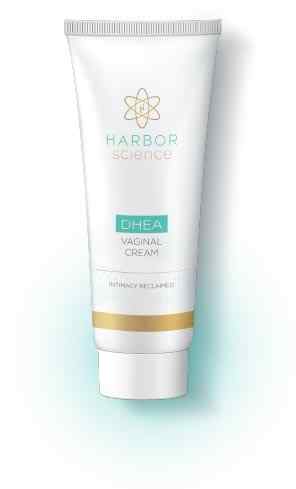Don’t Let Age Get in the Way of Sex

Low sex drive is a common occurrence during menopause, and its severity is even more pronounced in women who have experienced surgical menopause such as in those who have undergone a hysterectomy. The crash in hormone levels, especially that of estradiol, is a main culprit behind what many women experience as painful vaginal sex or dyspareunia. Estradiol is the primary hormone associated with maintaining vaginal wall thickness and elasticity, as well as vaginal lubrication. As estrogen falls, the fragile vaginal tissues begin to thin and become dry, and any friction can cause tears leading to bothersome itching or outright painful sex.
Fortunately, there are a whole host of systemic and localized treatment options available that vary from estrogenic hormones to even a few hormones that are non-estrogenic which have all been studied to rejuvenate the vaginal lining and replenishing vaginal lubrication.
If systemic HRT doesn’t sound right for you, fear not, there are other options that are available.
Estradiol is your body’s most potent estrogen and does most of the work. It can help replenish the lost vaginal lubrication, and also heal diminished or thinning vaginal tissue, commonly referred to as vaginal atrophy.
Even though it is generally thought of as safe when used vaginally, estradiol is quite a potent hormone, and can cause other estrogenic effects such as growth of the endometrial lining, which can lead to issues such as abnormal uterine bleeding or spotting, as well as breast tenderness and enlargement. This is normal and is typically offset when there is sufficient progesterone present in the body. But if you are menopausal, chances are that your progesterone will be too low to counteract these effects – and if you’re not taking any form of HRT, the chances are that you aren’t taking any progesterone either. Most OBGYN’s have this tool in their repertoire, and it is a common treatment strategy.
If estradiol causes too many side effects or if your dryness isn’t too severe, then another estrogen related treatment option is estriol cream. Estriol is commonly referred to as the hormone of pregnancy. It isn’t an FDA approved treatment in the US, but its use has been approved in many countries around the world for mild to moderate vaginal dryness in both cream and vaginal ovule forms. Since it is a weaker estrogen, it doesn’t cause the extent of estrogenic side effects which are common with vaginal estradiol. Estriol is also touted for its urogynecological effects as it can greatly aid women experiencing urinary incontinence during menopause. Since estriol isn’t an FDA approved medication, you’ll need to get this one from a compounding pharmacy. It’s important that your compounding pharmacy mixes your estriol cream with pH balance in mind since this will help prevent any other type of bacterial overgrowth. If you want to reap the benefits of both estradiol and estriol, ask your compounding pharmacy about biest estrogen cream.
Learn more about Estriol Vaginal Cream.
If estrogen creams are just too scary and you’re still worried about cancer and blood clotting, then the next two options are definitely worth checking out.
Many of you may have heard of the commercially-available prescription drug Intrarosa. The active ingredient in Intrarosa is prasterone, which is a manmade form of a hormone called dehydroepiandrosterone (DHEA). What is DHEA? DHEA is a hormone that is produced by your adrenal glands and is responsible for things like helping your body with stress. It’s also a precursor hormone, which means that it gets turned into other hormones such as testosterone and estradiol. As a medication, DHEA is used to treat vaginal atrophy and its related sexual dysfunction. In fact, studies using vaginal DHEA for women have shown improvements in sexual desire, arousal, lubrication, ability to orgasm, sexual satisfaction, and improvements in pain.
One of the other benefits of using DHEA cream is that at typical doses of 0.5% and 1%, the levels of DHEA metabolites, estradiol and testosterone, in serum remain within safe limits. Your compounding pharmacy will be able to provide this mediation as well.
Learn more about DHEA Vaginal Cream.

If you want to stay away from anything estrogenic, or anything that can cause your estrogen to increase at all, and still want the benefits of decreased pain and increased lubrication during sex, then this may be great option.
Oxytocin is a hormone that is considered to be the hormone of desire, social recognition, and of bonding. In fact, it increases five times its normal level during sexual climax. Medical literature confirms that the higher your levels of oxytocin are, the more intense and more frequent the orgasm. Studies with vaginal treatments with oxytocin have shown improvements in vaginal atrophy in menopausal women and have shown a normalization of the vaginal mucosa as the cells in the vaginal wall heal, improvement in painful intercourse, and relief of soreness. Studies have also shown that levels of estrogen in the body do not rise after treatment with oxytocin gel – which is amazing since there are so few treatment options for those who want to avoid estrogen.
Whether a systemic therapy is desired to achieve overall better health, or a more localized treatment option is more tolerated because of risks or risk factors, all of these therapies can help with vaginal dryness and decreased lubrication associated with menopause. Painless, enjoyable sex is possible again!
If you’re interested in any of these treatment options, call one of our hormone experts at Harbor Compounding Pharmacy for more information, or if you’d like for us to request a prescription for one of these medications from your doctor, please submit the form below. We’re here to help!
| Drug Therapy | Important Notes |
|---|---|
| Bioidentical HRT | For Optimal Health Estradiol + Progesterone |
| Estradiol Vag. Cream | Moderate to Severe Vaginal Atrophy |
| Estriol Vag. Cream | Mild to Moderate Vaginal Atrophy |
| DHEA Vag. Cream | Increases of Estradiol and Testosterone are within normal limits |
| Oxytocin Vaginal Gel | No increase in Estradiol |
Learn more about Oxytocin Vaginal Gel.



